During pregnancy, you can safely enjoy several herbal tea blends that offer numerous benefits. Ginger and lemon tea can ease morning sickness, while raspberry leaf may help prepare your body for labor. Peppermint and chamomile can soothe digestive issues and promote relaxation. For a nutrient boost, try nettle and dandelion or oatstraw and alfalfa blends. Rosehip and hibiscus offer immune support, while fennel and anise can combat bloating. Always consult your healthcare provider before incorporating new teas into your routine, as some herbs should be avoided during pregnancy. Exploring these options can help you discover comforting and beneficial brews for your journey.
Benefits of Herbal Teas During Pregnancy

Herbal tea enthusiasts often tout the numerous benefits these soothing brews can offer expectant mothers. During pregnancy, you'll find that certain herbal teas can provide natural relief for common discomforts while supporting your overall well-being.
These teas can help ease morning sickness, reduce bloating, and alleviate constipation, which are frequent concerns during pregnancy. Many herbal teas are rich in essential vitamins and minerals, supporting your body's increased nutritional needs. They can boost your immune system, helping you fight off infections more effectively.
Some blends may also promote better sleep, which becomes increasingly important as your pregnancy progresses. Herbal teas can be a great way to stay hydrated without resorting to sugary drinks. They're often caffeine-free, making them a safe alternative to coffee or regular tea.
Some blends, like red raspberry leaf tea, are believed to tone the uterus and prepare it for labor. However, it's vital to consult your healthcare provider before incorporating any new herbal teas into your diet, as some may not be suitable during pregnancy.
Always choose high-quality, organic blends to guarantee you're getting the best benefits for you and your baby.
Ginger and Lemon Blend
For centuries, expectant mothers have turned to the soothing combination of ginger and lemon to ease pregnancy discomforts. This powerful duo offers a range of benefits tailored to your needs during pregnancy.
Ginger, known for its anti-nausea properties, can help alleviate morning sickness and reduce general queasiness. It has also been shown to aid digestion and reduce inflammation, which can be particularly helpful as your body adjusts to pregnancy changes.
Lemon, on the other hand, provides a revitalizing boost of vitamin C, supporting your immune system and helping your body absorb iron more efficiently.
To prepare this blend, you'll need fresh ginger root and organic lemons. Slice a small piece of ginger and squeeze half a lemon into hot water. Let it steep for 5-10 minutes before drinking. You can adjust the quantities to suit your taste preferences.
While this blend is generally safe, it's crucial to consume it in moderation. Excessive ginger intake may increase the risk of bleeding, so limit yourself to 1-2 cups daily.
As with any herbal remedy during pregnancy, it's wise to consult your healthcare provider before incorporating it into your routine.
Raspberry Leaf Tea Mixture
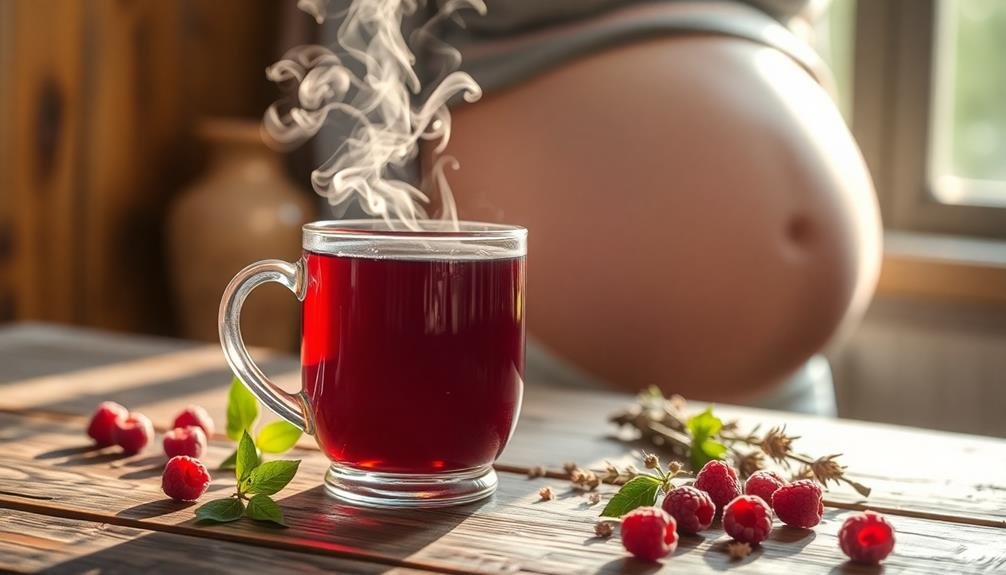
Raspberry leaf tea mixture can offer significant benefits during pregnancy, particularly in the third trimester.
You'll find it may help tone your uterus, potentially easing labor and delivery.
To prepare it properly, steep one tablespoon of dried raspberry leaves in hot water for 10 minutes, and enjoy up to three cups daily after consulting your healthcare provider.
Benefits During Pregnancy
Three key benefits make raspberry leaf tea a popular choice for expectant mothers. First, it's believed to tone and strengthen your uterus, potentially easing labor and delivery. The tea contains fragarine, a compound that may help tighten pelvic muscles and reduce labor pain.
Secondly, raspberry leaf tea is rich in vitamins and minerals essential for pregnancy. It's packed with iron, which helps prevent anemia, and calcium, vital for your baby's bone development. The tea also contains vitamins A, C, and E, supporting your immune system and overall health.
Lastly, many women report that raspberry leaf tea helps alleviate common pregnancy discomforts. It may reduce morning sickness, ease leg cramps, and decrease fluid retention. Some studies suggest it can even lower the risk of preterm labor and postpartum hemorrhage.
While these benefits are promising, it's important to consult your healthcare provider before adding raspberry leaf tea to your pregnancy routine. They'll help you determine the right time to start drinking it and the appropriate dosage for your individual needs.
Proper Preparation Methods
To prepare raspberry leaf tea properly, you'll need to follow a few key steps. Start by selecting high-quality dried raspberry leaves from a reputable source. Use one to two teaspoons of leaves per cup of water, depending on your desired strength. Boil fresh, filtered water and pour it over the leaves in a teapot or infuser. Let the tea steep for 5-10 minutes, then strain and enjoy.
For ideal benefits, consider these preparation methods:
| Method | Instructions |
|---|---|
| Hot Infusion | Steep leaves in boiling water for 10-15 minutes |
| Cold Brew | Steep leaves in cold water for 4-8 hours in the refrigerator |
| Sun Tea | Place leaves in a glass jar with water, let sit in sunlight for 2-4 hours |
| Iced Tea | Prepare hot infusion, then chill and serve over ice |
Remember to drink raspberry leaf tea in moderation during pregnancy. It's best to start with one cup a day and gradually increase to three cups daily in the third trimester. Always consult your healthcare provider before adding any herbal teas to your pregnancy diet, as individual needs may vary.
Peppermint and Chamomile Combination
A popular blend among expectant mothers combines the soothing properties of peppermint and chamomile. This duo offers a range of benefits that can help alleviate common pregnancy discomforts.
Peppermint's invigorating taste and aroma can ease nausea and indigestion, while chamomile's calming effects may reduce stress and promote better sleep.
To create this blend, you'll want to use equal parts of dried peppermint and chamomile flowers. Steep one teaspoon of the mixture in eight ounces of hot water for 5-7 minutes. It's best to drink this tea in moderation, limiting yourself to 1-2 cups per day.
While generally considered safe, it's important to consult your healthcare provider before incorporating any herbal teas into your pregnancy diet. Some women may need to avoid peppermint if they experience heartburn, as it can relax the esophageal sphincter.
Additionally, if you have allergies to plants in the daisy family, you might need to skip chamomile.
Remember to choose organic, high-quality herbs to guarantee you're avoiding potential pesticides or contaminants.
Nettle and Dandelion Infusion
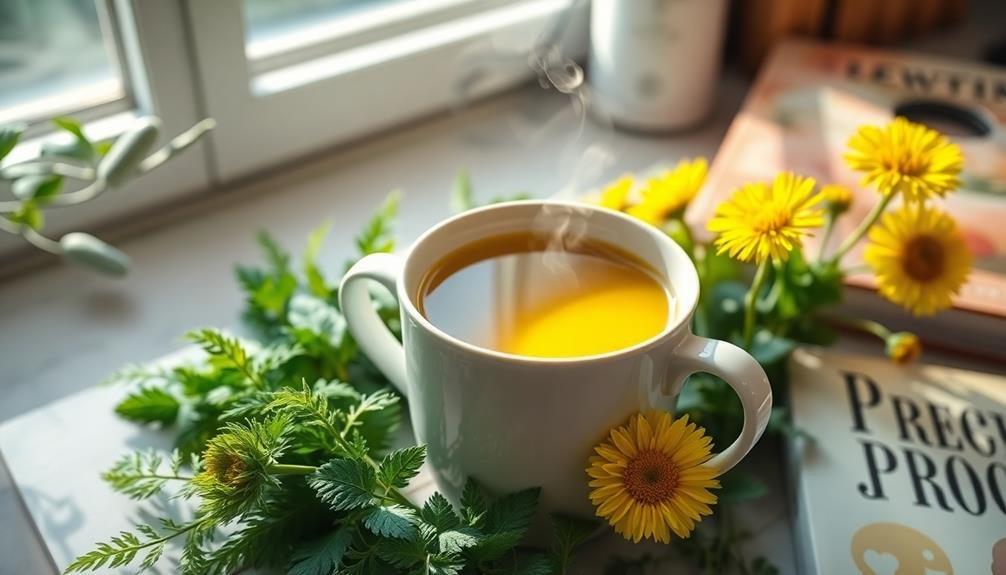
You'll find nettle and dandelion infusion to be a powerhouse of nutrients for pregnancy support.
To prepare this blend, steep one teaspoon each of dried nettle leaves and dandelion root in hot water for 10-15 minutes.
It's recommended to drink one to two cups daily, but always consult your healthcare provider before incorporating new herbal teas into your pregnancy regimen.
Nutrient-Rich Pregnancy Support
Many expectant mothers seek natural ways to boost their nutrient intake during pregnancy. Nettle and dandelion infusion offers a nutrient-rich blend that can support your body during this vital time. This herbal combination provides essential vitamins and minerals that are particularly beneficial for expectant mothers.
Nettle, a powerhouse of nutrients, is rich in iron, calcium, and vitamin K. Dandelion leaves complement this blend with their high content of vitamins A and C. Together, they create a potent infusion that can help support your pregnancy in several ways:
- Increased iron absorption, potentially reducing the risk of anemia
- Enhanced calcium intake for bone health and fetal development
- Natural diuretic properties to help manage fluid retention
- Gentle liver support to aid in detoxification processes
To prepare this infusion, steep one tablespoon each of dried nettle and dandelion leaves in hot water for 10-15 minutes. You can enjoy this tea once or twice daily, but always consult your healthcare provider before adding any new herbal remedies to your pregnancy routine.
Preparation and Dosage
For ideal benefits, proper preparation and dosage of nettle and dandelion infusion are essential. To make this nutrient-rich blend, use 1 ounce (28 grams) of dried nettle leaves and 1 ounce of dried dandelion leaves per quart (32 ounces) of boiling water. Steep the herbs for 4-8 hours or overnight, then strain and refrigerate. You can drink this infusion hot or cold, aiming for 2-3 cups daily.
Remember to start with small amounts and gradually increase your intake, especially if you're new to these herbs. It's vital to listen to your body and consult your healthcare provider before incorporating any new herbal remedies into your pregnancy routine.
Here's a quick reference guide for preparing and consuming nettle and dandelion infusion:
| Step | Action | Duration |
|---|---|---|
| 1 | Boil water | Until bubbling |
| 2 | Add herbs | Immediately |
| 3 | Steep | 4-8 hours |
| 4 | Strain and store | Refrigerate |
You can enhance the flavor by adding a squeeze of lemon or a touch of honey. Don't forget to stay hydrated with plain water alongside your herbal infusions.
Rooibos and Vanilla Blend
With its smooth, caffeine-free profile, the Rooibos and Vanilla Blend offers expectant mothers a comforting and flavorful tea option. This South African herbal tea, combined with the sweet aroma of vanilla, provides a soothing experience while supporting your pregnancy journey.
Rooibos is rich in antioxidants and minerals, making it an excellent choice for expectant mothers seeking a healthy beverage alternative.
To fully enjoy the benefits of this blend, consider the following tips:
- Steep the tea for 5-7 minutes to extract maximum flavor and nutrients
- Enjoy it hot or iced, depending on your preference and the weather
- Add a slice of lemon or a touch of honey for extra flavor, if desired
- Limit consumption to 2-3 cups per day to maintain a balanced diet
You'll find that this blend not only satisfies your taste buds but also helps alleviate common pregnancy discomforts.
The naturally sweet flavor of rooibos, enhanced by vanilla, can curb sugar cravings and provide a moment of relaxation during your busy day.
As with any herbal tea, it's always best to consult your healthcare provider before incorporating it into your pregnancy routine.
Lemon Balm and Lavender Tea
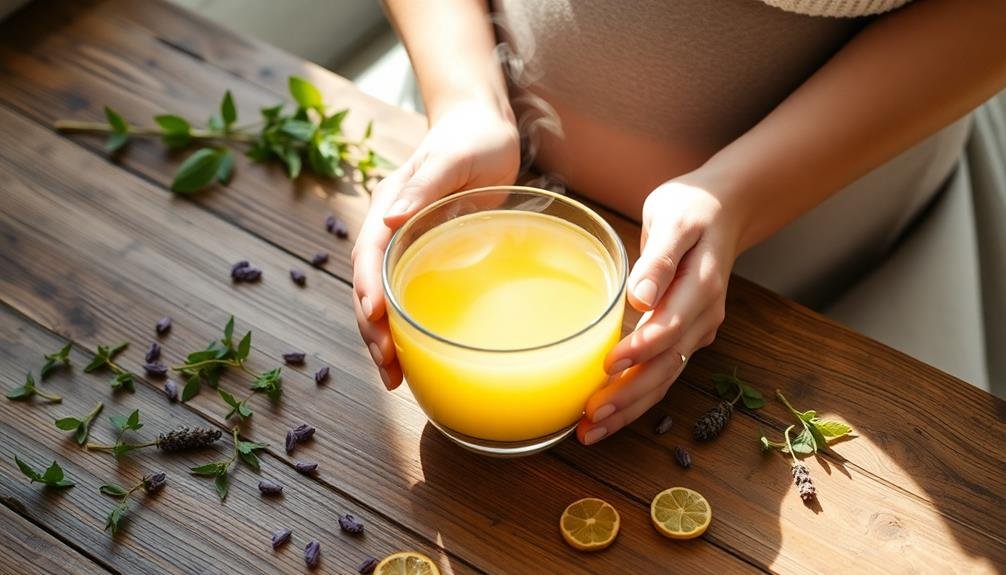
If you're struggling with pregnancy anxiety and sleep issues, a lemon balm and lavender tea blend might be your perfect solution.
This calming herbal combination can help soothe your nerves and promote better sleep during pregnancy.
You'll want to prepare this tea by steeping one teaspoon each of dried lemon balm and lavender in hot water for 5-10 minutes, limiting yourself to one cup per day.
Calming Pregnancy Anxiety
Pregnancy anxiety affects countless expectant mothers, but a soothing blend of lemon balm and lavender tea can offer natural relief. This herbal combination is known for its calming properties, helping to ease stress and promote relaxation during pregnancy.
You'll find that sipping this tea can provide a moment of tranquility amid the whirlwind of emotions and physical changes you're experiencing.
To maximize the benefits of lemon balm and lavender tea for anxiety relief, consider the following tips:
- Brew the tea using fresh or dried herbs, steeping for 5-10 minutes
- Drink 1-2 cups daily, preferably in the evening or during stressful moments
- Pair the tea with deep breathing exercises or meditation for enhanced relaxation
- Consult your healthcare provider before incorporating any new herbal remedies
The gentle aroma of lavender combined with the mild citrus notes of lemon balm creates a sensory experience that can help calm your mind and body.
You'll appreciate how this tea blend not only soothes anxiety but also supports overall well-being during pregnancy.
Sleep-Inducing Herbal Blend
Two powerhouse herbs, lemon balm and lavender, combine to create a sleep-inducing tea blend that's perfect for expectant mothers struggling with insomnia. This soothing concoction offers a natural alternative to over-the-counter sleep aids, which you should avoid during pregnancy.
Lemon balm, a member of the mint family, has been used for centuries to promote relaxation and improve sleep quality. It contains compounds that help reduce anxiety and calm your nervous system.
Lavender, known for its distinctive aroma, complements lemon balm by enhancing its sedative effects. This fragrant herb has been shown to increase slow-wave sleep, allowing you to wake up feeling more refreshed.
To prepare this blend, steep one teaspoon each of dried lemon balm and lavender in hot water for 5-7 minutes. Drink this tea about an hour before bedtime to give it time to take effect. You can add a touch of honey for sweetness if desired.
Remember to consult your healthcare provider before incorporating any new herbs into your pregnancy diet, as some may interact with medications or have contraindications for certain conditions.
Preparation and Dosage
Proper preparation and dosage are vital for enjoying the full benefits of this lemon balm and lavender tea blend safely during pregnancy. To make this soothing herbal infusion, you'll need 1 teaspoon of dried lemon balm leaves and 1 teaspoon of dried lavender flowers per cup of water. Steep the herbs in boiling water for 5-10 minutes, then strain and enjoy.
For best safety and effectiveness during pregnancy, follow these guidelines:
- Limit your intake to 1-2 cups per day
- Don't consume this blend in the first trimester
- Use organic, high-quality herbs to avoid pesticides
- Discontinue use if you experience any adverse reactions
It's important to remember that while this herbal blend is generally considered safe for expectant mothers, you should always consult with your healthcare provider before incorporating any new herbs or teas into your pregnancy diet.
They can provide personalized advice based on your specific health needs and pregnancy status. By following these preparation and dosage recommendations, you can safely enjoy the calming and sleep-inducing benefits of this lemon balm and lavender tea blend throughout your pregnancy journey.
Oatstraw and Alfalfa Blend
This nutrient-rich blend combines the soothing properties of oatstraw with the mineral-packed goodness of alfalfa. Oatstraw, derived from the green tops of oat plants, is known for its calming effects and high calcium content. It can help reduce stress and anxiety during pregnancy while supporting bone health.
Alfalfa, a nutrient-dense legume, provides essential vitamins and minerals, including iron, which is vital for expectant mothers.
You'll find this blend particularly beneficial in the second and third trimesters. It can help alleviate leg cramps, strengthen your immune system, and support healthy blood pressure levels.
To prepare the tea, mix equal parts of dried oatstraw and alfalfa leaves. Use one tablespoon of the blend per cup of hot water and steep for 10-15 minutes.
Drink up to three cups daily, but start with one cup to make sure you tolerate it well. If you experience any adverse reactions, discontinue use and consult your healthcare provider.
While this blend is generally safe, it's always best to check with your doctor before adding any new herbal teas to your pregnancy diet.
Rosehip and Hibiscus Infusion
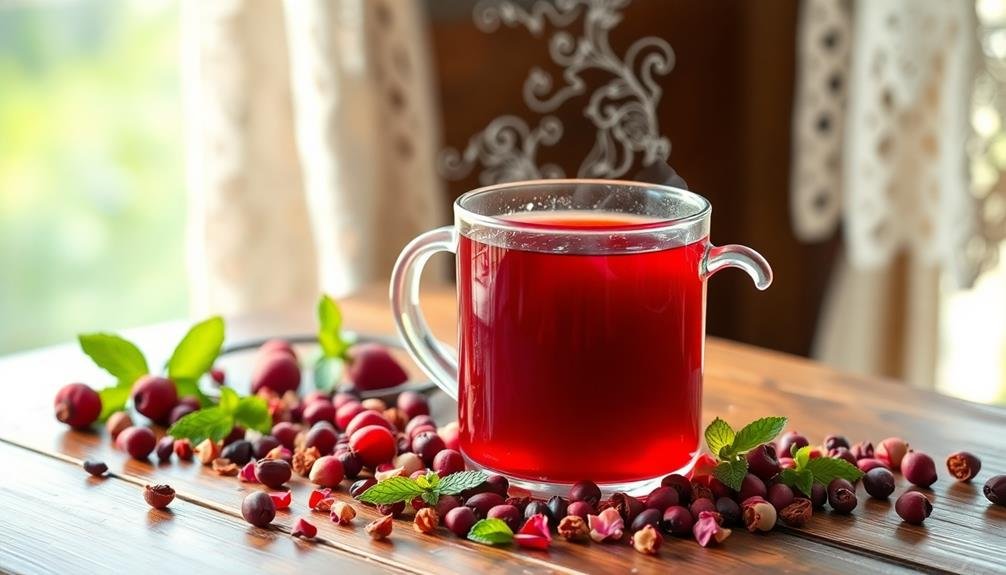
Moving from nutrient-rich green herbs to vibrant florals, let's explore the Rosehip and Hibiscus Infusion. This delightful blend combines the tangy sweetness of rosehips with the tart punch of hibiscus, creating a revitalizing and healthful drink for expectant mothers.
Rosehips, the fruit of the rose plant, are packed with vitamin C and antioxidants, supporting your immune system during pregnancy. Hibiscus, known for its deep red color, offers a wealth of benefits, including potential blood pressure regulation and mild diuretic properties.
When brewing this infusion, you'll notice:
- A beautiful ruby-red color
- A fruity, slightly tart aroma
- An invigorating taste that's perfect hot or iced
- A natural caffeine-free option for any time of day
While generally considered safe, it's important to consume hibiscus in moderation during pregnancy. Some studies suggest that high doses may affect estrogen levels.
As with any herbal tea, consult your healthcare provider before adding it to your routine.
You can enjoy this infusion plain or add a touch of honey for sweetness. It's a delicious way to stay hydrated and nourish your body during pregnancy.
Fennel and Anise Seed Tea
An aromatic blend of fennel and anise seeds creates a soothing tea that's particularly beneficial for expectant mothers. This flavorful combination offers a range of potential benefits during pregnancy, including relief from digestive discomfort and nausea.
Fennel seeds contain compounds that may help reduce bloating and gas, common issues during pregnancy. They're also rich in iron, which is vital for maintaining healthy blood levels. Anise seeds complement fennel's effects by potentially easing indigestion and promoting better sleep.
To prepare this tea, you'll need equal parts fennel and anise seeds. Crush them lightly to release their oils, then steep in hot water for 5-7 minutes. Strain and enjoy warm or iced. You can add a touch of honey for sweetness if desired.
While generally considered safe, it's important to consume this tea in moderation. Limit yourself to one or two cups daily, and always consult your healthcare provider before incorporating new herbal teas into your pregnancy diet.
They can advise on potential interactions with medications or individual health concerns.
Herbs to Avoid While Pregnant
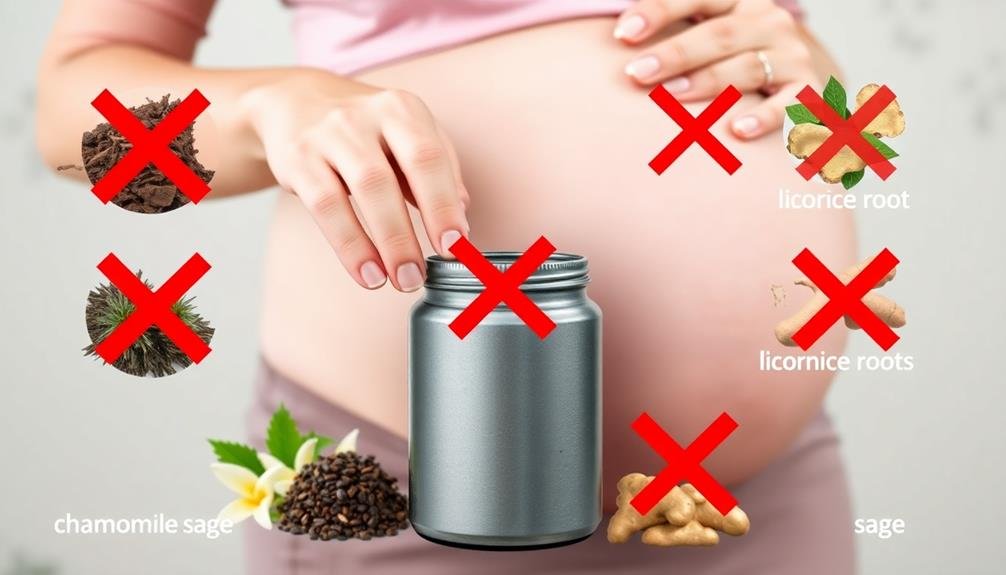
While some herbal teas can be beneficial during pregnancy, it's important to be aware of herbs that could pose risks to you and your baby. Certain herbs contain compounds that may stimulate uterine contractions, affect hormone levels, or potentially harm fetal development.
To guarantee your safety and that of your unborn child, you'll want to avoid these common herbs during pregnancy:
- Sage: Known for its hormonal effects, sage can potentially decrease milk production and impact fetal development.
- Parsley: In large amounts, it may stimulate uterine contractions and increase the risk of miscarriage.
- Licorice root: It can affect cortisol levels and may increase the risk of preterm labor.
- Pennyroyal: This herb is particularly dangerous and can cause serious complications.
Other herbs to avoid include dong quai, black cohosh, and blue cohosh.
Always consult with your healthcare provider before consuming any herbal tea during pregnancy. It's essential to remember that "natural" doesn't always mean safe.
When in doubt, stick to well-researched, pregnancy-safe options like ginger, peppermint, or raspberry leaf tea. Your caution will help guarantee a healthy pregnancy and protect your developing baby.
Frequently Asked Questions
Can I Drink Caffeinated Teas During Pregnancy?
You should limit your caffeine intake during pregnancy. It's best to avoid or greatly reduce caffeinated teas. Stick to no more than 200mg of caffeine daily. Consider switching to decaf or herbal alternatives for a safer option.
How Many Cups of Herbal Tea Are Safe to Consume Daily?
You'll want to limit your herbal tea intake to 2-3 cups daily. It's best to consult your healthcare provider, as some herbs can be harmful during pregnancy. Always choose pregnancy-safe teas and avoid excessive consumption.
Are There Any Side Effects of Drinking Herbal Teas While Pregnant?
While most herbal teas are safe, you should be cautious. Some can cause side effects like nausea or contractions. Always consult your doctor before drinking herbal teas during pregnancy. It's best to stick with approved options.
Can Herbal Teas Help With Morning Sickness and Nausea?
Yes, certain herbal teas can help with morning sickness and nausea during pregnancy. You'll find ginger, peppermint, and chamomile teas particularly effective. They're natural remedies that may soothe your stomach and reduce nausea symptoms. Always consult your doctor first.
Should I Consult My Healthcare Provider Before Drinking Herbal Teas During Pregnancy?
Yes, you should always consult your healthcare provider before drinking herbal teas during pregnancy. They'll assess your individual health needs and advise on which teas are safe for you and your baby. Don't take risks without expert guidance.
In Summary
You've now discovered some safe and beneficial herbal tea blends for your pregnancy journey. Remember, it's essential to consult your healthcare provider before trying any new herbs or teas. Enjoy these soothing blends in moderation, and don't forget to stay hydrated with plenty of water too. By choosing the right herbal teas, you'll not only quench your thirst but also support your overall well-being during this special time. Happy sipping!

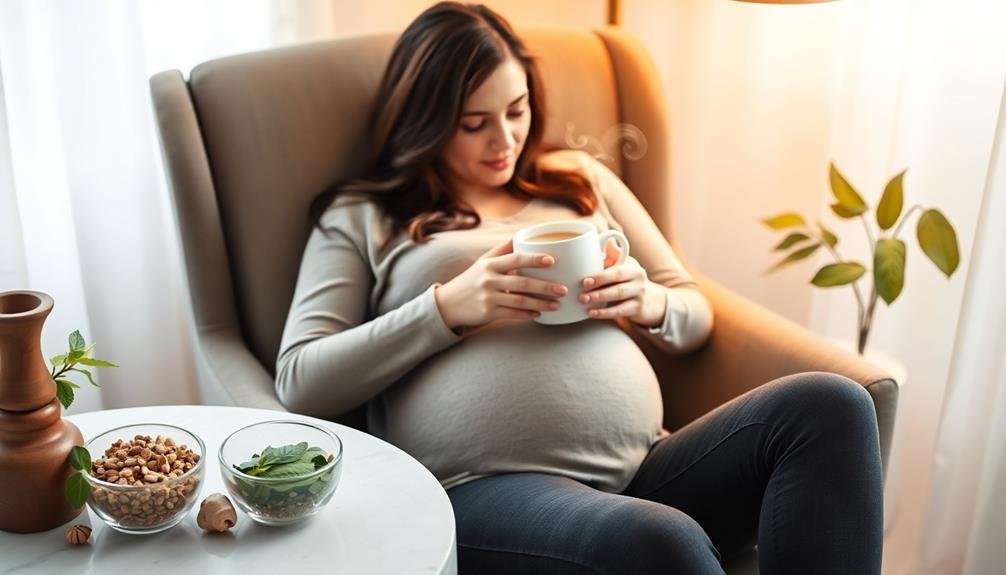



Leave a Reply